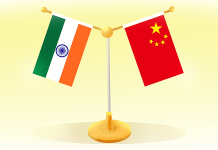India has strongly condemned and rejected the latest report by the United States Commission on International Religious Freedom (USCIRF), which accused the country of violating religious freedom. The Ministry of External Affairs (MEA) dismissed the allegations, calling the report biased, inaccurate, and politically motivated.
In This Article:
MEA spokesperson Randhir Jaiswal issued a firm statement, emphasizing that India does not recognize the credibility of the USCIRF. He described the report as part of a deliberate campaign to tarnish India’s global image and accused the commission of operating with prejudiced motives.
“India is a multi-religious, democratic country where the Constitution guarantees religious freedom to all citizens. Reports such as these reflect a one-sided narrative and a deliberate attempt to distort facts,” said Jaiswal.
This is not the first time India has rejected such claims. In previous years, USCIRF has consistently singled out India for criticism, despite the country’s constitutional safeguards and legal mechanisms protecting religious minorities.
India’s Key Objections to the USCIRF Report
The Indian government has raised several concerns regarding the methodology, intent, and findings of the USCIRF report. These objections highlight the flaws and inconsistencies in the report’s approach.
1. Lack of Objectivity and Transparency
- The MEA has pointed out that the USCIRF consistently relies on biased sources and selective data to support its claims.
- The report does not engage with Indian authorities or independent institutions before making allegations.
- It ignores constitutional and legal safeguards that protect religious minorities in India.
2. One-Sided Narrative Ignoring Religious Diversity
- India is home to one of the most diverse religious landscapes in the world, with Hindus, Muslims, Christians, Sikhs, Buddhists, Jains, and other communities living together.
- The report cherry-picks isolated incidents while ignoring the larger context of religious harmony in the country.
- It fails to acknowledge India’s laws, policies, and institutional mechanisms that protect religious minorities.
3. Ignoring India’s Legal Safeguards for Religious Freedom
- The Indian Constitution guarantees the right to freedom of religion under Article 25-28.
- India has a strong legal system that protects minorities from discrimination and violence.
- The report fails to acknowledge legal actions taken against individuals or groups involved in religious hate crimes.
4. Double Standards in Assessing Religious Freedom
- The MEA has pointed out that similar reports ignore religious intolerance in Western nations.
- The USCIRF has been accused of targeting specific countries while overlooking growing religious intolerance in the U.S. and Europe.
- India believes such reports are part of a larger geopolitical strategy to exert pressure on sovereign nations.
International Reactions and Diplomatic Implications
USCIRF’s Influence on US Policy
The USCIRF is a non-governmental advisory body that recommends foreign policy measures to the US State Department. It has previously suggested placing India on the Countries of Particular Concern (CPC) list, which could lead to diplomatic friction between India and the US.
However, successive US administrations, including the Biden administration, have ignored these recommendations, recognizing India as a strategic partner with shared democratic values.
US Congress and Think Tanks Criticize USCIRF
Several US lawmakers and foreign policy experts have questioned the credibility of the USCIRF. Critics argue that the commission operates with preconceived notions and fails to consider ground realities.
“The USCIRF has lost its credibility due to its biased approach. It ignores religious intolerance in Western nations while unfairly targeting India,” said a senior US foreign policy analyst.
India’s Stand: No External Interference in Internal Affairs
The MEA has made it clear that India will not tolerate any external interference in its internal affairs. The government maintains that India’s democratic institutions, independent judiciary, and constitutional framework are more than capable of handling any concerns regarding religious freedom.
“India does not need external certification on its democratic and pluralistic values. We reject any attempts to interfere in our domestic affairs,” the MEA spokesperson stated.
Moving Forward: A Pattern of Misinformation?
The USCIRF’s annual reports have repeatedly drawn criticism for being selective and politically motivated. While claiming to advocate for religious freedom, the commission has often been accused of using its platform to further geopolitical agendas.India, as the world’s largest democracy, continues to uphold religious freedom through constitutional protections, legal mechanisms, and democratic institutions. The Indian government, scholars, and legal experts have called for a more balanced and fact-based approach in assessing religious freedom worldwide.
By – Nikita




